Goodnight Nobody
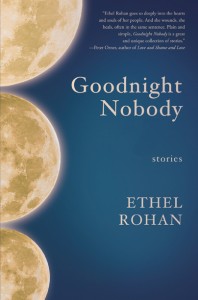 Goodnight Nobody
Goodnight Nobody
by Ethel Rohan
Queen’s Ferry Press, September 2013
138 pages
Phantom pains are a phenomena in which the patient suffers pain in a limb that is no longer part of the body. In Ethel Rohan’s Goodnight Nobody, symbolic phantom pains abound and absence makes the longing for completion more keen. There is a subdued humanity in each of the thirty stories that mix melancholy and joy with a sense of loneliness. In “The Splitting Image,” twin boys are identical apart from a missing arm on one. Despite their mirrored images, their personalities could not be more different. This disparity becomes a schism symbolized by the absent arm. One brother wants a whole arm to be complete while the other wishes his brother would “take it. Just fucking take it.” Unfortunately, it’s neither his to give nor his brother’s to take, and both are stuck as they are.
Likewise, thirteen-year-old Esther has lost her grandfather to spontaneous combustion in “Out of the Ashes.” Speculations from those around them run rampant, including ones that his death had something to do with supernatural forces. All the talk has her disconcerted and her mother has taken it hardest, verbally exploding at someone who asks about the cryptic nature of his death. Esther is helpless to act and wonders if her grandpa truly had made some type of sinister deal. The threat of such a possibility scares her and her sense of alienation is emphasized by the burn of the sun.
There’s an organic melding of themes and the obsessions the characters wield in many of the stories. In “Bee Killer,” the disconnect between a husband and wife is represented by a hive of bees the husband maintains. The emotional gulf between them is both grand and dwindling, difficult to articulate and yet swarming with stinging malcontent. He seems more concerned with the bees than her well being. It’s the quiet discontents that add up and eventually overwhelm:
“What about the queen?” I said. “The colony would be nothing without the queen.”
“She’s as much a slave to duty as the rest,” he said. “Average queen lays two million eggs in her lifetime.” He went on to tell me how a sick bee leaves the colony to die alone, so as not to infect the others. “Sacrifices himself,” he said.
“Plenty of us do that,” I said.
A photographer from “Darkroom” is going blind from a condition that is both “genetic and degenerative.” Fueled by her pending blindness, she wants to capture “the photograph of a lifetime.” The permanence of the camera becomes a substitute for the deterioration in her eyes and the visibility that will soon escape her. Capturing an image of the giraffe becomes the specific target and she goes on an adventure with her husband to get it. It seems foolhardy, until we realize it’s her way of warding off the inevitability of permanent darkness:
“I wish the blindness would just come and take my eyes right now.” Her voice shook and she held herself. “I hate the waiting.”
He pulled her into his arms and hid his tears in her hair, seeing those zoo elephants from so long ago and remembering the tickle of the animal’s trunk on his palm and the side of his face, its breath warm and pleasant, but searching, searching.
All of Rohan’s characters search for things they can’t have and the prose is elegantly wrought, neither excessively sentimental nor overtly flashy. Instead, there is a lush rhythm in the sentences that renders observations in natural beats. Judgment is suppressed in favor of an understanding of the complexities of friendship and family, however quaint or unusual. Irish settings for many of the stories act as a unique brogue against the landscape of the collection. Everyone is drifting, flotsam from the shipwreck of modern conjunctions. The shorter length of many of the stories make them seem like splices from a bigger sampling, a gauge on the tempo of a bigger macrocosm.
August 2nd, 2013 / 11:00 am
Player of Games
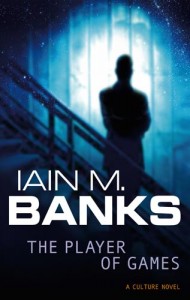 Player of Games
Player of Games
by Iain M. Banks
Orbit (Reprint Edition), 2008
416 pages / $15.99 Buy from Amazon
Iain M. Banks passed away on June 9th of this year from terminal cancer to the gallbladder. He had a prolific career with 27 books and came to fame with his first book, The Wasp Factory. I’ve been reading his Culture series after multiple friends urged me to read his work, declaring Banks was the best science fiction writer they’d read. The Player of Games is the second book in the Culture series and probably my favorite in the series so far, mainly because it revolves around gaming. I did a book review of the first one, Consider Phlebas, for HTMLGiant here, and while this review complements that first part, it also serves as a tribute to Banks with quotes from some of his interviews before his recent passing.
At the center of this massive, sprawling universe is the Culture. The Culture is an egalitarian form of government based in a post-scarcity world which means that everything is free because of an abundance of resources. This allows people to pursue what they want to without worry of making enough money to survive. The way the Culture maintains everything is by putting computer AIs, or Minds, in charge of the government. As anyone who has seen Star Trek can testify, even in a post-scarcity world, people can be corrupt and pursue agendas that are counter-intuitive, motivated by greed and vanity. Since the Culture is made up of robots who find such notions puerile, they do a good job maintaining the status quo. There are also no such things as laws per se. Everyone has everything they need so many of the motives for crime have vanished.
Player of Games was first published in 1988, though it was reworked from an earlier version Banks started in 1979. It exemplifies the best of the Culture books with beautiful writing, exotic locations, and thrilling plots full of intrigue. Ironically, things start slowly in an idyllic world where people can play games all day and tedium is the biggest malaise they suffer from. Gurgeh is a master of games who is bored with life because he is too good at them. While he might lose a game or two (there are even some games he is not good at), Gurgeh has a sense for gameplay that helps him to master almost anything. “I… exult when I win. It’s better than love, it’s better than sex or any glanding; it’s the only instant when I feel… real.” Only, most of the games no longer cause that sensation as no one can offer him a true challenge.
Partly motivated by his boredom and further pushed into it through a blackmail scheme perpetrated by a Culture drone, he is sent by Contact (the special forces division of the Culture) to infiltrate the Empire of Azad. His mission, outwardly, seems simple. Learn the game of Azad and play it to the best of his abilities. What exactly is the game? “The game of Azad permeated every level of society, like a single steady theme nearly buried in a cacophony of noise, and Gurgeh started to see what the drone Worthil had meant when it said Contact suspected it was the game that held the Empire together.” Official positions are awarded by rankings in the game and the winner becomes Emperor. “The idea, you see, is that Azad is so complex, so subtle, so flexible and so demanding that it is as precise and comprehensive a model of life as it is possible to construct. Whoever succeeds at the game succeeds in life (italics are mine); the same qualities are required in each to ensure dominance.”
Gurgeh starts the game badly, even worse than people had expected, caught up in minutia about the game he can’t grasp. That’s when he changes tactics and focuses on the psychology of his foes and realizes that the rest were “too concerned with winning the game quickly… the moves could become a language, and Gurgeh thought he could speak that language now, well enough to lie in it.” Banks takes the readers away from the specifics of the game and concentrates on how the different personalities play in different ways to reflect who they are. The broader strokes makes for a far more interesting read as it becomes a strategic war of wills between individuals.
July 31st, 2013 / 11:00 am
Pestilence by Jason Jordan
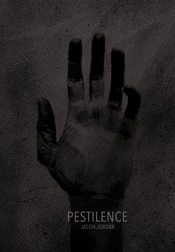 Pestilence
Pestilence
by Jason Jordan
Keyhole Press, 2013
58 Pages / $9.99 Buy from Keyhole Press
Strange situations infect the stories in Jason Jordan’s Pestilence and the unusual premise of each tale blends the surreal with everyday life in a disturbingly enchanting mix. In “Pestilence,” the eponymous story upon which the collection is titled, there is a new plague that visits a building every day of the week. Monday has corpses appearing randomly, then disappearing at midnight. Tuesday has hives of bees that swarm the residents. On Wednesday, they all need scuba gear as the entire building is flooded. The narrator invites a journalist to document the plagues that visit their house. He wants the anomalies within the building to be reported on, yet refrains from personal details about the inhabitants as he’s saving that information for the national media. While the reporter reacts with terror to what he witnesses, the residents are oddly indifferent. After the reporter endures two days of the plagues, he is ready to leave:
The pestilence becomes a decrepit bridge through which the narrator hopes to connect to the world. He is disappointed, then, when he finds out their house is misrepresented in the published article.
In similar form, the characters in the collection attempt to break the quarantine that separates them from everyone else. This is the second book by Jason Jordan I am reading and if there’s an aspect that ties his previous work, The Dying Horse, with Pestilence, it’s a chill attitude by the character in the face of horrors. In the case of “The House of Ice,” that’s a literal chill. The whole house is frozen along with the owner, Bill Jones, his dog, and even the cardinal. There is no explanation given for the freeze and after they are thawed, no one seems to care:
July 15th, 2013 / 11:00 am
Consider Phlebas
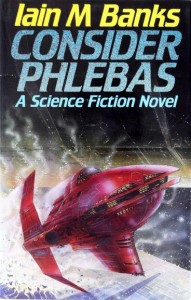
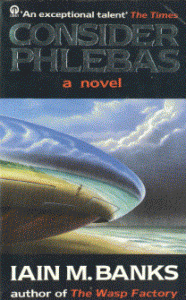
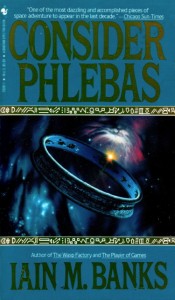
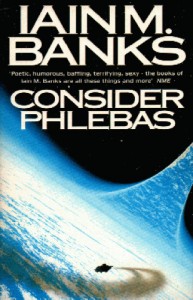

Consider Phlebas
by Iain Banks
Republished by Orbit, 2008
On Amazon
***
When I think of the best science fiction, I never think of it as actual science fiction. Rather, tales of humanity revealing glimpses into its nature that would otherwise be difficult to convey without the facade of artificial quasars and exotic aliens. “Iain Banks has ruined most sci-fi for me,” said a friend who was recommending the Culture series to me. With the recent news that Iain Banks was suffering from a terminal cancer to his gallbladder, I felt it was time to dive into this long and branching series I’d been hearing about for so long. I started with the first book, Consider Phlebas, which on the surface is a space opera with swash buckling action. It’s set to the backdrop of a war that is taking place between the Culture and the religiously fanatical civilization called the Idirans. The machines of the Culture are more complex than humans and have unique personalities that help calculate/determine their future. When the Mind of a brand new Culture ship escapes into a Planet of the Dead, the two factions race to retrieve it. The protagonist is Horza, a shape-changer sent by the Idirans because he has special access to the planet that the others do not.
The title, Consider Phlebas, comes from T.S. Eliot’s The Waste Land and like The Waste Land, there are mixes of satire and futurism in the chapters that balance fantastic elements with descriptions that make it easy for a reader to envision. Take for example, the description of an Orbital (an artificial planet/ring world) being destroyed by the Culture as a result of the war: “…a single narrow line of blinding white light appeared right across the breadth of the day side of the Orbital, a thin fiery blade of silent destruction which was instantly surrounded by the duller but still perfectly white cover of clouds. That line of light was part of the grid itself, the fabric of pure energy which lay underneath the entire universe, separating this one from the slightly younger, slightly smaller antimatter universe beneath… The Orbital was now a rosette of white flat squares backing slowly away from each other toward the stars: four hundred separate slabs of quickly freezing water, silt, land and base material, angling out above or underneath the plane of the system’s planets like flat square worlds themselves. There was a moment of grace then, as Vavatch died in solitary blazing splendor.” I could see Vavatch’s last moments in my head and marveled at the creative way Banks depicted the scene. There are many such moments and the imagery has a palpable intensity to it.
July 1st, 2013 / 11:00 am
You Can Make Him Like You
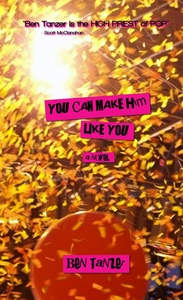 You Can Make Him Like You
You Can Make Him Like You
by Ben Tanzer
Artistically Declined Press, 2011
222 pages / $12 Buy from Amazon or Artistically Declined
Ben Tanzer’s You Can Make Him Like You bursts off the opening page with an intense stream of prose swathed in Hold Steady songs. The thirty-something narrator, Keith, is frenetic with lust and desires, and he also wants to have sex with his wife more often. Terse sentences spit out observations that meander between pithy and neurotically self-conscious. When confronted with an attractive intern who seems to be flirting with him, he wonders: “Why did I mention my wife. Why wouldn’t I mention her? The intern twirls her hair a little. Fuck, twirling hair is not good. Not good.”
Self-delusion isn’t a foible Keith suffers from. Self-analysis is as it paralyzes his actions. His candor is inimitable and torturously funny. Uncertainty mars every decision, particularly fidelity. Even as he fantasizes about other women, when given the chance to actually stray, he remains faithful to his wife, Liz. It doesn’t mean he isn’t impervious to temptation, as with the love of his life in high school who throws herself at him, or a neighbor who is aspiring to be a singer at Disneyland and invites him in. “It’s like bad porn, or worse, some masturbatory fantasy of mine where hot, barely dressed Opera singing neighbor comes to the door and says she has something for me before inviting me in.” After following her in, she offers him a gift. “‘They’re Mickey Mouse coffee mugs, one for you and one for your wife. They’re really cute and when I saw them I knew they were perfect.’” To which he mentally responds: “She definitely does not want to fuck. I am mostly relieved, though more than anything I realize that I am done, really done, getting myself into these situations. It’s not cool anymore. It never really was.”
Keith finds parallels to his life in popular TV shows like Mad Men and the Shield. The pop references become his lens through which he makes sense of his striving to be both a “human” and an “adult.” Even if you might not know a specific reference, the meaning is clear, as when he’s talking about a boy crush on Don Draper and how “doughy everyone is at those conventions on Real Sex.” Unlike the suave Don Draper or the savage Vic Mackey though, Keith isn’t as direct in his relationships and often tries to avoid confrontation. There’s a funny arc involving different neighbors because their apartment walls are so thin and they can hear everything next door. His wife wants him to talk to the loud neighbors, and because a stream of them moves in and out, they tease, titillate, annoy, irritate, frighten, and finally empathize. Empathy is a big part of why You Can Make Him Like You sucks you into the story. As Keith struggles with his work, his wandering eye, and Liz’s desire for a baby, Tanzer recreates the chaotic mumblings of the mind with its narcissism, longings, self-conscious doubts, joys, and moments of self-realization that also end in self-disgust: “It’s funny what envy looks like when you’re caught in the middle of it. It’s ugly and distorted, like the way your reflection gets warped on the side of a sweaty drink. It’s not you, but it is a part of you, the worst part, the weakest, least thoughtful, most irrational you, that for the most part you get to keep hidden until the moment it overwhelms your usual ability to filter out your more negative thoughts.”
June 21st, 2013 / 11:00 am
Could You Be With Her Now
 Could You Be With Her Now
Could You Be With Her Now
by Jen Michalski
Dzanc Books, 2013
180 pages / $15.95 Buy from Amazon or Dzanc Books
Stephen King called novellas an “ill-defined and disreputable literary banana republic.” In Jen Michalski’s Could You Be With Her Now, she gives us two very different samples of the republic. “May-September” is about a May-December romance and is lyrically written with a fascinating sensuality exploring relationships through the rhythms of music and stories. “I Can Make It To California Before It’s Time For Dinner” is about a mentally challenged fourteen-year-old who undertakes a haunting journey and is also a social commentary on the nature of entertainment when it intersects with reality. Together, they comprise a powerful one-two punch on the ecology of longing and desire, though it was the odyssey in “I Can Make It To California Before It’s Time For Dinner” that compelled me to write this review and what I’ll be focusing on.
In the novella, Jimmy, the mentally challenged boy who serves as narrator, can’t differentiate reality from TV. That’s why he thinks the actress on the screen, Megan, is his girlfriend. When his brother, Josh, challenges him to find her, he mistakes a local girl for the actress and accosts her. Throughout, the writing is deceptively simple, mimicking the tones of a young boy while blurring the boundaries between reality and illusion as we’re sucked into Jimmy’s world. “I pretend I’m a dinosaur eating people,” he says, and there’s a charm in the way he interprets experiences that are confusing to him through the prism of television and family anecdotes. The voice Michalski creates is funny and yet consistently unique in the way his view of the world is so fragmented. In some ways, when I initially read the description about the novella, I thought of Lenny from John Steinbeck’s Of Mice and Men. They are both beautifully written to fit the narrative and weave a haunting track of prose. But the parallels end quickly when Jimmy gets into a scuffle with the girl, and in a moment of panic, kills her, thinking merely that she’s gone to sleep. Again, the diction shows us that Jimmy is unaware of the gravity of what he’s done and he gets lost after his brother sends him away to hide from the police.
Jimmy wanders into a group of truckers at a gas station where he meets Ed. His only point of reference for strangers are cartoons. Ed is “short and fat like a Weeble and has a moustache like Yosemite Sam, but he is not a cartoon he is a real man.” In this case, entertainment gives him a false sense of comfort and when Ed offers to take him home out of concern, Jimmy goes along. But it becomes clear that taking him home is the furthest thing from Ed’s mind. The interactions between Ed and Jimmy start off innocently enough, but get brutally graphic and disturbing. Ed is a sexual predator, intending to exploit Jimmy. Jimmy, oblivious to the danger he’s in, explains his experiences with an innocence that makes every sentence difficult to read for everything that we have to read between the lines. Michalski constructs two layers of understanding to contrast Jimmy’s inability to understand what’s really going and the reality that the reader is forced to fill in between the gaps, resulting in an even more disturbing experience: “My legs are tired and they want to sleep and so do I. I am mad at Josh but when I get home I won’t hate him because he is my brother. God hears everything I say so I love Josh, love Josh, love Josh. Also, God, please I am lost and I need a telephone and a puppy for Christmas.”
June 14th, 2013 / 11:00 am
From Old Notebooks by Evan Lavender-Smith
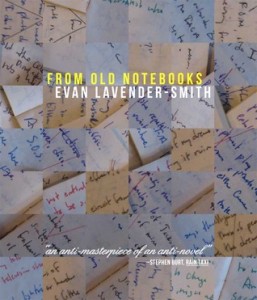 From Old Notebooks
From Old Notebooks
by Evan Lavender-Smith
Dzanc Books, December 2012
182 pages / $15 Buy from Dzanc Books
Martin Heidegger posited the idea that all criticism is existential and there is no impartial analysis outside of the experience of the reader. A reviewer of Evan Lavender-Smith’s From Old Notebooks asks: “Should the reader of F.O.N. expect the meaning or truth of the book to lie with its author? Does the truth/meaning of the book lie outside the book?” Furthermore: “There may be some question as to F.O.N.’s status as fiction, poetry, philosophy, nonfiction, etc. but hopefully there will be no question about its status as a book.” Both comments are from Evan Lavender-Smith critiquing his own book within the pages of From Old Notebooks, even revealing: “Why am I so averse to the idea of classifying F.O.N. as poetry? – Because poetry doesn’t sell.” That’s the way From Old Notebooks rolls, defying genre and classification, even defying the traditional boundaries of author and reader. On the exterior, it reads like a notebook filled with philosophical musings, hermeneutics, the germs of story ideas, dialectical exposition, hagiographies on dubious beliefs, aphorisms made ironic by their sincerity, and letters to death. But the flow of the notebooks is deceptively simple, appearing like a random collection of ideas when it’s in fact a journey through the Penrose stairs of Smith’s mind.
I came across From Old Notebooks several years ago when it was first published by BlazeVOX. F.O.N. was one of the first postmodern/experimental works I’d read. Since then, I’ve read a lot more experimental works, some of my recent favorites including Robert Kloss’s The Alligators of Abraham; One by Blake Butler, Vanessa Place, and Chris Higgs; and Janice Lee’s Daughter. With F.O.N. recently reissued by Dzanc Books, I was excited about diving back in. It’s hard to analyze experimental works because the experience the reader has is so subjective and without making assumptions about the author’s intent, a huge part of the critique, for me, comes down to how the work resonates on a personal level. Explorations of infinity and thought stripped away from form involve literary techniques that are invented along the path of creation, and as a result, often defy formulaic definition. That is what makes these works so bold and compelling. Part of the allure of From Old Notebooks, then, is its accessibility.
The subject matter and the themes vary, encompassing everything from film quirks to quandaries on death, musings on poetry, and pornographic abstinence. The notes incorporate personal whimsies, fears, and even worries about family. Rather than obfuscate, we have a movement toward revelation. But the investigation branches into even more questions and there’s a playfulness in the tone that engenders the feeling of a contemporized Socratic enquiry, only with oneself. As a few examples:
“God endowed the universe with an infinite number of signs, but only one fact.”
“Qualifying death as “unknowable” is, finally, an act of cowardice; death as “unknowable” preserves mystery, the possibility of mystery. The truth atheist knows death intimately; for him, there is nothing at all mysterious about death.”
“Perhaps they would be more palatable if independent films had more explosions in them.”
“Should I be concerned about exploiting my children by including them in F.O.N.?”
“Consciousness is my worst habit.”
June 10th, 2013 / 11:00 am
Boss Fight Books!
 Gabe Durham is starting up an incredibly cool new press called Boss Fight Books that will revolve around creating great books about classic video games. The launch titles will be Earthbound, Galaga, Super Mario Bros. 2, ZZT, and Jagged Alliance 2 with a great lineup of authors from a variety of backgrounds. These include Ken Baumann, Michael Kimball, Anna Anthropy, Jon Irwin, and Darius Kazemi. I recorded a two minute video short with short clips for each of the games to commemorate and celebrate the news, as well as a reminder of how cool each of the titles were. I got goosebumps just recording/playing Earthbound again! As their Kickstarter surpassed initial expectations, it’s happening for sure, though you can still get in on the action and help them reach their stretch goals by clicking the link below. The first of the books is coming out near the end of the year and there’s a lot more of the details on the link. The book covers look beautiful and you can check out what the press will be about directly from Gabe Durham and Ken Baumann on the Kickstarter page. And of course, make sure to check out the books when they release, as well as the games themselves!
Gabe Durham is starting up an incredibly cool new press called Boss Fight Books that will revolve around creating great books about classic video games. The launch titles will be Earthbound, Galaga, Super Mario Bros. 2, ZZT, and Jagged Alliance 2 with a great lineup of authors from a variety of backgrounds. These include Ken Baumann, Michael Kimball, Anna Anthropy, Jon Irwin, and Darius Kazemi. I recorded a two minute video short with short clips for each of the games to commemorate and celebrate the news, as well as a reminder of how cool each of the titles were. I got goosebumps just recording/playing Earthbound again! As their Kickstarter surpassed initial expectations, it’s happening for sure, though you can still get in on the action and help them reach their stretch goals by clicking the link below. The first of the books is coming out near the end of the year and there’s a lot more of the details on the link. The book covers look beautiful and you can check out what the press will be about directly from Gabe Durham and Ken Baumann on the Kickstarter page. And of course, make sure to check out the books when they release, as well as the games themselves!
More info on the Kickstarter Page.
Some info directly from the site:
The Series:
Each of the books will take a critical, creative, historical, and personal look at a single classic video game.Some books will be about the history of the game’s creation, some will focus on particular elements like level design, story, and music, some will investigate the subculture that has formed around a game, some will bring in outside art, science, and media, some will have a strong autobiographical element. Many books will be a combination of all these things.
The Format:
All the books will be available in paperback and ebook (all formats), and sold both directly from our site and from other major online bookstores. Each book will be numbered, collectible, and will look great on your shelf together.
My Pet Serial Killer Video
Check out this My Pet Serial Killer (by Michael Seidlinger) Video Review by Angela Xu and Peter Tieryas Liu. Starring Hannah Lee. Read Peter Tieryas Liu review on HTMLGIANT here.
Dysfunction
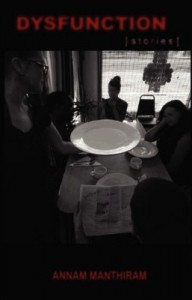 Dysfunction
Dysfunction
by Annam Manthiram
Aqueous Press, December 2012
170 pages / $14 Buy from Amazon or Aqueous Press
The dysfunctional nature of many of the characters that populate Annam Manthiram’s Dysfunction only serve to highlight their strange humanity. Throughout, “Variations on a Blossoming Marriage,” we are treated to an alphabetical catalog of failed relationships. The description for Calla Lily is poignantly emblematic of a plight the characters share: “He liked white— white everything. White sheets, white toothpaste, even white curry. I didn’t know how to make white curry. Everything I touched turned brown.” The clash of tactile expectation versus the moment of actual contact is the intersection that the stories hinge on and that fulcrum becomes more pronounced with the cultural context denoted by brown.
In “Asha Ma,” we are taken through the life of a young Indian woman. From the moment she is born, there is an invisible gauge against which her life is measured. When she fails to match the barometer her mother hoped for during a ritual performed for her first birthday, she is deemed “inauspicious” and “a sacrilege.” The irony is that, of course, a simple baby game intended for playful festivities takes on religious connotations that would haunt her life. In high school, she is often mistaken for another Indian student named Cynthia. When Cynthia takes time off from school due to chicken pox, Asha masquerades as Cynthia, and in a sad commentary on racial stereotypes, the other students can’t tell the difference. No expected fallout happens upon Cynthia’s return, who simply refers Asha to the principal and he in turn to a therapist. Neither of them can help her find what she wasn’t able to track down for her birthday ritual; her identity, mainly because the given categories didn’t fit. A disconnected relationship happens with her co-worker, Joe, whom she both attracts and repels. It ends when she makes out with a stranger at a party Joe invited her to (more specifically, the stranger licks her clavicle). Again, there is no blowout, no jealous outrage by Joe. Instead, he falls for another woman at the office and moves on. The story reaches its denouement with a sordid revelation of a past affair from her parents that causes Asha to come to terms with her absent self. The ending consists of self-discovery in defying self-discovery. Pat epiphanies about ‘place in the world’ are replaced by acceptance of the void of simple being and the climax defuses itself similar to the other encounters in the story.
June 3rd, 2013 / 11:00 am
